Best website hosting providers with pros and cons
Finding The good web hosting service take a lot of time and money. To take dicision.
To justify the dicision we’ve signed up with, tested and compared more than 30 different web hosting provider companies. This means that we also have performance data of the web hosting service.
Uptime and load time are two of the most important factors when choosing a web host (next to their cost).
Here is our review process in detail:
- We sign up with the web hosting plan offered by the hosting service
- We set up a blank WordPress website
- We monitor their performance, such as uptime and load time
- We check their features, limitations, pricing and customer support
- We publish the review (updating once a year)
All of our hosting reviews are based on each web host’s average speed (load time), uptime and cost. If you want more detailed data, see our data page or this spreadsheet.
10 Best Hosting Services for New Websites
Below is a list of 10 best website hosting providers that we’ve found reliable and with good speed. They have all performed well in the last 24-months.
1. Bluehost – Best Overall
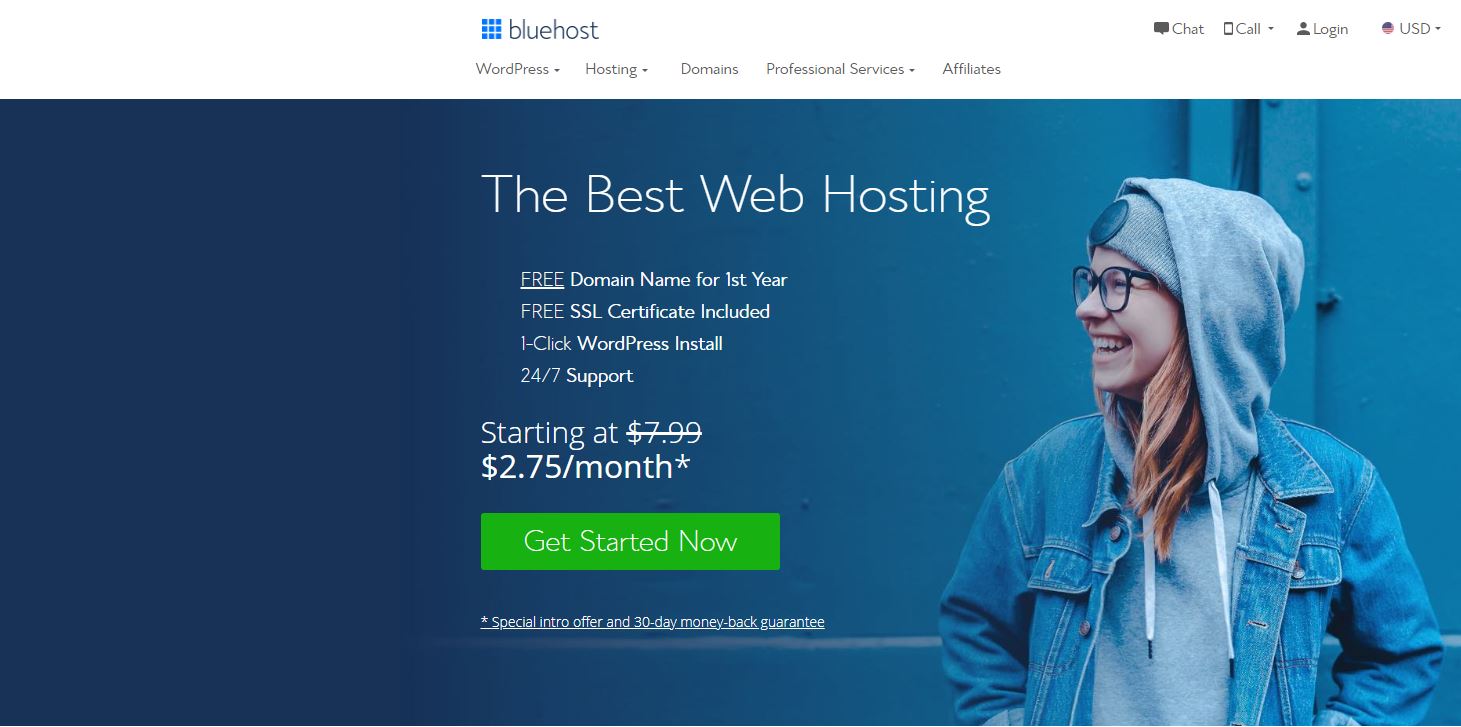
Bluehost Pros
+ Best uptime (99.99%)
+ Top 5 speed (405 ms)
+ One-Click-Install for WordPress
+ Easy to use, beginner-friendly
+ Free domain and site builder
+ 24/7 support (chat and phone)
Bluehost Cons
– Discounts for longer plans only
+ Best uptime (99.99%)
+ Top 5 speed (405 ms)
+ One-Click-Install for WordPress
+ Easy to use, beginner-friendly
+ Free domain and site builder
+ 24/7 support (chat and phone)
Bluehost Cons
– Discounts for longer plans only
Bluehost web hosting has been around since 2007 and they now host more than 3,000,000 websites. They are the most popular, low-cost hosting option for new websites.
They are our top-rated web hosting company because their last 24-month uptime and speed are very strong – 99.99% and 405 ms, respectively.
Their 3-year introductory price is $2.75/mo (renews $7.95) and that comes with features like free domain name, website builder and one-click install for WordPress, Joomla, and Drupal through cPanel. So for starters (someone without a website), this is probably the best option. Unmetered bandwidth and 50 GB storage are included in the basic plan.
It’s a great fit for WordPress websites since it’s officially recommended by WordPress.org
Bluehost also free email accounts, 24/7 live customer support and SSL (security layer) on all plans. It’s very easy to use and probably the best entry-level web hosting provider that is both reliable and secure. In addition to traditional shared hosting, the company also offers dedicated, VPS and managed WordPress hosting plans for higher traffic websites.
All of their hosting plans come with a 30-day money-back guarantee and get instantly activated, so you can start using them right away.

2. HostGator Cloud – Best Cheap Cloud
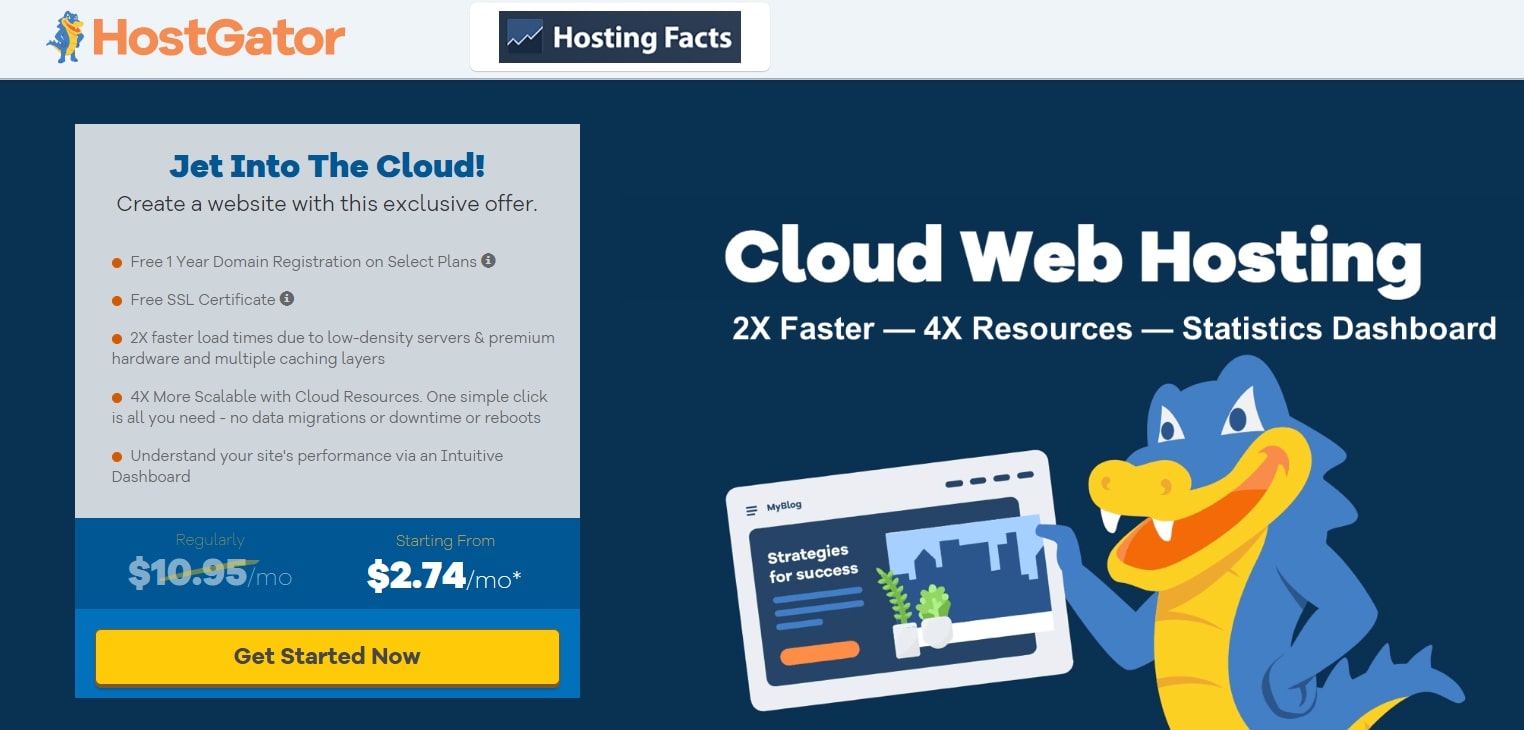
HostGator Cloud Pros
+ Top 5 uptime (99.99%)
+ Top 5 speed (399 ms)
+ Free website transfer
+ No bandwidth and storage limit
+ Multiple datacenter locations
+ Unlimited email accounts
HostGator Cloud Cons
– Higher renewal cost
+ Top 5 uptime (99.99%)
+ Top 5 speed (399 ms)
+ Free website transfer
+ No bandwidth and storage limit
+ Multiple datacenter locations
+ Unlimited email accounts
HostGator Cloud Cons
– Higher renewal cost
HostGator, founded in 2002, is a popular shared and cloud hosting provider that is currently hosting over 2,000,000 websites.
According to our last 24-month data, HostGator Cloud has a strong uptime (99.99%) and above-average speed (399 ms) making it a strong contender to Bluehost.
HostGator offers flexible features, such as unlimited email account, unmetered bandwidth, unmetered disk space and built-in cache on all plans. Furthermore, all of their hosting plans come with a 99.9% uptime guarantee, free SSL certificate, easy WordPress installs, and a free domain for a year (when you sign up for 12, 24 or 36 months).
If you want to build a custom website, you can do so with the Gator Website Builder. It’s a HostGator’s drag and drop website builder designed to be an easy, eCommerce-friendly site builder for beginners.
HostGator’s cheapest plan starts from $2.74/mo (when you choose a 12-month payment plan) and renews $10.95/mo. Other than shared cloud hosting, HostGator offers WordPress, VPS and dedicated hosting plans serving all size organizations from small businesses to enterprise websites.
All plans come with a generous 45-day money-back guarantee.

Visit HostGator.com to get started
…or read our detailed HostGator Cloud review
…or read our detailed HostGator Cloud review
3. Hostinger – Cheapest Price

Hostinger Pros
+ Top 2 load time (350 ms)
+ Cheap pricing ($0.99/mo)
+ Datacenters in US, Europe & Asia
+ Free SSL certificate
+ 24/7 support chat
Hostinger Cons
– No free domain
– Limited bandwidth on the cheap plan
+ Top 2 load time (350 ms)
+ Cheap pricing ($0.99/mo)
+ Datacenters in US, Europe & Asia
+ Free SSL certificate
+ 24/7 support chat
Hostinger Cons
– No free domain
– Limited bandwidth on the cheap plan
Our last 24-month data shows that Hostinger has an average uptime of 99.95%, but a very fast average loading time of 350 ms making it the best cheap web hosting you can find.
Hostinger (who also owns Hosting24) offers extremely affordable hosting plans without compromising too much on the quality and performance of the service. While it’s cheap on the price, the features that come with Hostinger’s plans will appeal to many beginner website owners.
The company offers a variety of hosting plans with different features and all plans come with an easy website builder, free SSL certificate, 99.9% uptime guarantee and 24/7/365 support.
Hostinger’s cheapest plan starts from just $0.99/mo (when you choose a 48-month payment plan), renewals start at $2.15/mo. Bandwidth and databases are unlimited unless you choose the “Single Web Hosting” plan. With the latter you’ll be limited to 10GB of disk space, 100GB of bandwidth, one MySQL database, and one email account. Most notably, the cheapest plan doesn’t include a free domain and has limited processing power and memory.
Other services provided by Hostinger include Cloud, Email, WordPress, VPS, Windows VPS hosting.
All plans come with a standard 30-day money-back guarantee.

4. GreenGeeks – Best “Green” Hosting

GreenGeeks Pros
+ Good load time (445 ms)
+ Stable uptime (99.98%)
+ US, Canada & Netherlands servers
+ Free site transfer
+ Unlimited bandwidth and storage
GreenGeeks Cons
– Questionable refund policy
– High renewal cost
+ Good load time (445 ms)
+ Stable uptime (99.98%)
+ US, Canada & Netherlands servers
+ Free site transfer
+ Unlimited bandwidth and storage
GreenGeeks Cons
– Questionable refund policy
– High renewal cost
GreenGeeks has been around 12+ years and hosts over 500,000 websites.
With 99.98% uptimes and load speeds of 445 ms, GreenGeeks offers fast and reliable hosting at an affordable rate of $2.95/month. Add to this their feature-rich bonuses, high-quality 24/7 customer support, and environmentally friendly practices and it’s easy to see how GreenGeeks are quickly carving out a name for themselves in a wildly oversaturated market.
All plans come with a free domain for 1 year, cPanel access, free Wildcard SSL, PowerCacher, unlimited SSD storage, and unlimited data transfer. Customers also get an unlimited number of domain names, unlimited email accounts, and nightly backups.
If your website grows bigger, you can always upgrade to their more flexible VPS hosting. Also, GreenGeeks will migrate your site from your existing web host for free. Unfortunately, the $9.95/month renewal rate may dissuade some webmasters from choosing GreenGeeks over other hosting providers.
All plans come with a 30-day money-back guarantee.

5. DreamHost – Pay Monthly, No Higher Renewals

DreamHost Pros
+ Good load time (648 ms)
+ Uptime guarantee
+ Monthly plans available
+ 97-day money back guarantee
+ Unlimited bandwidth and storage
Dreamhost Cons
– Average uptime (99.94%)
– No cPanel
+ Good load time (648 ms)
+ Uptime guarantee
+ Monthly plans available
+ 97-day money back guarantee
+ Unlimited bandwidth and storage
Dreamhost Cons
– Average uptime (99.94%)
– No cPanel
Founded in 1996, DreamHost is one of the oldest web hosting providers. The company hosts over 1.5 million websites, blogs, and applications in more than 100 countries.
According to our last 24-month data, DreamHost has an average uptime (99.94%) and adequate speed (648 ms) making it a reliable hosting solution.
What makes DreamHost different from many other web hosting services is that they offer an option to pay monthly instead of yearly.
This means you can sign up for $4.95 and start using your hosting account right away. Alternatively, you can opt-in for a 3-year-plan which starts at $2.59/mo and renews at $4.95/mo. The basic plan includes a free domain, 1 website, unlimited bandwidth, and 50 GB SSD storage. Customers also get to use DreamHost’s drag-and-drop builder and can add an email for a monthly fee of $1.67/mo.
The company offers strong security features (LetsEncrypt SSL), a variety of domain management tools and unlimited data transfer per month. WordPress comes pre-installed and the company also has its own easy-to-use and beginner-friendly website builder. They don’t have cPanel which is well known in the web developers industry, but DreamHost offers their own admin panel which pretty much does the same as cPanel or Plesk.
All plans include 24/7 US live chat support. The company has a generous 97-day refund policy.

6. SiteGround – Best Customer Support
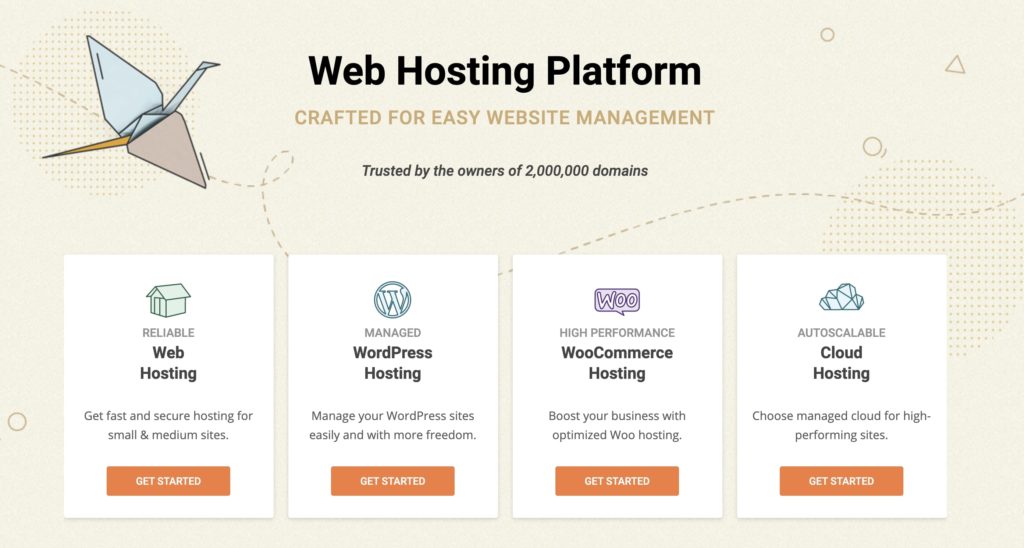
SiteGround Pros
+ Sufficient load time (673 ms)
+ Stable uptime (99.99%)
+ Knowledgable customer support
+ 24/7 “Guru” chat support
+ 20+ email accounts
SiteGround Cons
– Setup fee on monthly plans
– Limited cheap plan
+ Sufficient load time (673 ms)
+ Stable uptime (99.99%)
+ Knowledgable customer support
+ 24/7 “Guru” chat support
+ 20+ email accounts
SiteGround Cons
– Setup fee on monthly plans
– Limited cheap plan
SiteGround is a web hosting provider founded in 2004 in Sofia, Bulgaria. They’re hosting over 2 million domains and is one of the three web hosting companies officially recommended by WordPress.org.
According to our last 24-month data, SiteGround has a fantastic uptime (99.99%) and adequate speed (673 ms) making it a very strong top 10 web host.
SiteGround is well-known for its exemplary customer service and its user base is growing fast. All SiteGround hosting plans include website builder, email account, SSL, Cloudflare CDN, daily backups, and SSH access, for free.
The cheapest StartUp plan designed for beginners starts at $3.95/mo (when you pay for the 12-month plan), renewals start at $11.95/mo. You can host 1 website well-suited for ~10,000 monthly visits. The plan comes with 10 GB web space, unmetered traffic, and 24/7 support.
SiteGround has a wide line of services including managed WordPress hosting, WooCommerce hosting, cloud hosting, enterprise hosting, and dedicated servers. Instead of having in-house servers, they are renting servers from the Google cloud.
All plans come with an industry-standard 30-day money-back guarantee.

7. A2 Hosting – Fastest Shared Hosting
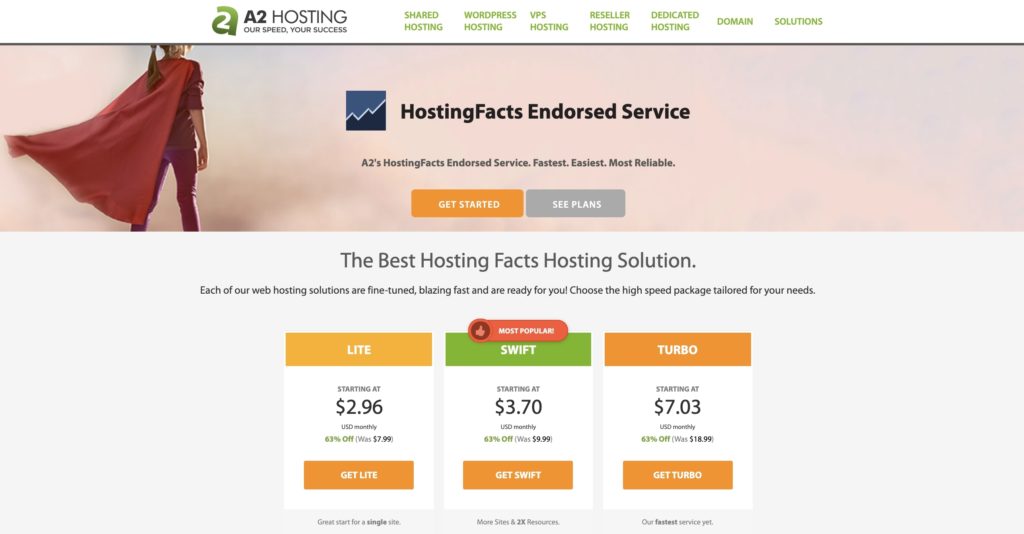
A2 Hosting Pros
+ Fastest load time (317 ms)
+ WordPress optimized servers
+ Unlimited bandwidth and storage
+ 24/7 “Guru” chat support
+ 20+ email accounts
A2 Hosting Cons
– Average uptime (99.93%)
– Higher renewal cost
+ Fastest load time (317 ms)
+ WordPress optimized servers
+ Unlimited bandwidth and storage
+ 24/7 “Guru” chat support
+ 20+ email accounts
A2 Hosting Cons
– Average uptime (99.93%)
– Higher renewal cost
US-based A2 Hosting (founded in 2002, hosting 500,000+ websites) is the fastest shared web hosting we’ve tested to date. They’ve managed to achieve an impressive 317 ms average load time over a period of 24-months.
A2 Hosting is fast because their servers are optimized for WordPress websites and they use LiteSpeed cache. Since we’ve reviewed more than 30+ shared web hosting companies, none of them are fast as A2.
Despite being the fastest, A2 isn’t as reliable. Their average uptime has been hovering around ~99.93%. It’s not much, but it’s more than ~6 hours of downtime each year.
The A2 hosting company is well-known for working seamlessly with all major content management systems including WordPress, Joomla, Drupal, OpenCart and Magento making it a great fit for web developers. The company offers a variety of hosting plans and they all include a free LetsEncrypt SSL certificate, unlimited SSD storage, and free site migration.
The cheapest plan “Lite” starts $2.96/mo (renews $7.99/mo) comes with 1 website, 25 email accounts, a domain name for 1 year, free Cloudflare CDN and unlimited bandwidth/disk space.
A2 Hosting has a reliable customer support team called “Guru Crew Support.” Customers can connect with them 24/7/365 via live chat, phone, email, and tickets. Next to regular, shared hosting, they also offer dedicated, VPS and reseller hosting for webmasters.
All plans come with a 30-day money-back guarantee.

8. WestHost

WestHost Pros
+ Good uptime (99.98%)
+ Cheap pricing
+ Free Cloudflare CDN
+ Backups included
WestHost Cons
– Below average load time (881 ms)
– SSL/free domain not included
– No cPanel or auto-installs
+ Good uptime (99.98%)
+ Cheap pricing
+ Free Cloudflare CDN
+ Backups included
WestHost Cons
– Below average load time (881 ms)
– SSL/free domain not included
– No cPanel or auto-installs
WestHost is a hosting company that is owned by thgingenuity Ltd. (UK company) which also owns MidPhase.
Our recent data show that WestHost has had an average uptime of 99.98% and a load time of 881 ms. We have seen that their speed hasn’t been among the top 15. However, due to their cheap pricing (starts $1.99/mo for a 3-year plan and renews $4.99/mo) and free CDN with site backups makes them a good hosting provider in the top 10.
Their uptime is above-average which makes WestHost a good option for small online business websites considering that it’s one of the cheapest web hosting solutions on the market – $1.99/mo for a 3-year plan.
Unfortunately, SSL and free domains are not included. If you want them from free, you’ll need to choose their higher-tier plan “Preferred”. The cheapest plan gives you FTP access only, so you are unable to use quick installs for CMS like WordPress making it a difficult choice for beginners.
Unlike other, more popular hosting services, WestHost only offers a standard shared hosting provider. So if your website grows, you’ll likely need to transfer your sites away from WestHost.

9. GoDaddy Hosting

GoDaddy Pros
+ Good load time (554 ms)
+ Good uptime (99.97%)
+ 100GB website storage
+ cPanel and website builder access
+ Uptime guarantee for 99.90%
GoDaddy Cons
– SSL & email costs extra
– No site transfers
+ Good load time (554 ms)
+ Good uptime (99.97%)
+ 100GB website storage
+ cPanel and website builder access
+ Uptime guarantee for 99.90%
GoDaddy Cons
– SSL & email costs extra
– No site transfers
GoDaddy is one of the leading hosting solutions powering over 44 million websites. The company has 14 facilities around the globe and is recognized as one of the largest domain registrars. They also offer web hosting services that are suitable for both small and very big websites. Similarly to SiteGround, they also don’t own their server park, instead they are partnered with Amazon and rent servers from AWS.
The last 2 years of tracking GoDaddy shared hosting has shown us an uptime of 99.97% and page speed around 554 ms which shows us that GoDaddy is a reliable provider. GoDaddy is an excellent solution for building custom websites as it comes with a simple drag-and-drop website builder (GoCentral) designed for beginners. It also features developer-friendly tools like MySQL, cPanel, CloudLinux, Python, and multiple versions of PHP.
Their cheapest web hosting plan starts from $4.33/mo (renews $8.99/mo) comes with 100GB of website storage (a lot) and unmetered bandwidth. Security monitoring and DDoS protection are included too.
However, GoDaddy has many “upsells” that will likely make you pay a bit more. For example, site backups, SSL certificates, and email accounts are not included in their cheapest plan. GoDaddy also offers 24/7 support.
All GoDaddy’s yearly and multi-year plans come with a 30-day money-back guarantee.

10. Site5
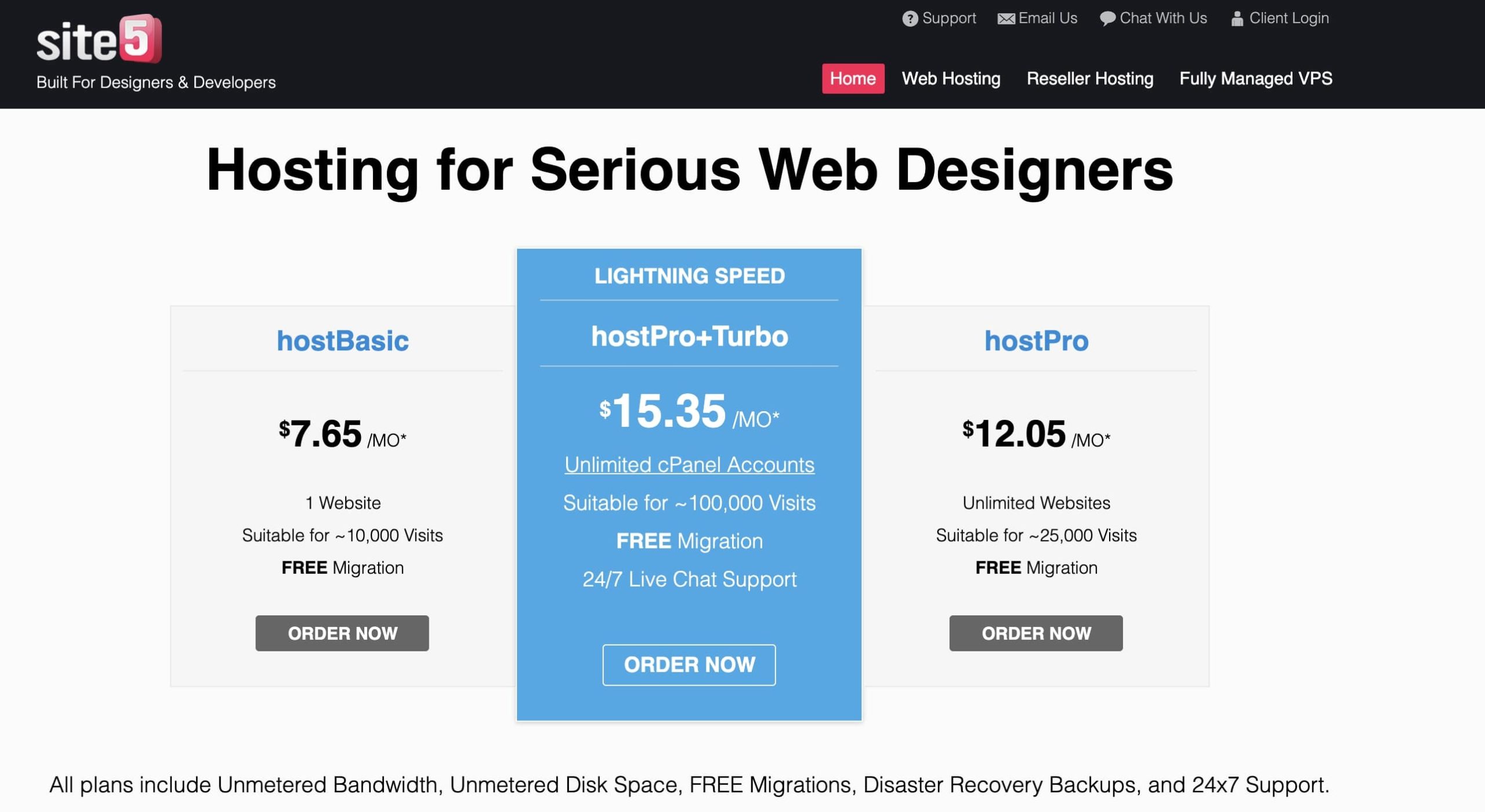
Site5 Pros
+ Good uptime (99.99%)
+ Above average speed (629 ms)
+ Free migrations
+ Unmetered bandwidth/storage
Site5
– Expensive pricing
– Limited cheap plan (10,000 visits max)
– Domain not free
+ Good uptime (99.99%)
+ Above average speed (629 ms)
+ Free migrations
+ Unmetered bandwidth/storage
Site5
– Expensive pricing
– Limited cheap plan (10,000 visits max)
– Domain not free
Site5 is a web hosting company founded in 1998, but later bought by Endurance International Group (EIG) – a major internet service provider that also owns better performing brands, such as Bluehost and HostGator.
According to our last 24-month data, Site5 has a solid uptime (99.99%) and an average page loading time of 629 ms.
Customers can easily install popular applications like Drupal, Joomla, ZenCart or PrestaShop through cPanel/WHM.
Site5’s cheapest shared hosting account starts at $7.65/mo (if you pay for a 2-year plan in advance). Unfortunately, their basic plan doesn’t include a free SSL nor a free domain but comes with unmetered disk space and bandwidth, 24/7 support and backup recovery.
Since Site5 doesn’t provide many features that beginners might benefit from, it’s probably a better choice for a web developer or designer who wants to use them as reseller hosting to bill clients.
All of their plans come with an industry-standard 30-day money-back guarantee.

30+ Hosting Reviews & Statistics
Each year we will slowly add more hosting providers to the list as soon as we have enough data on their performance (uptime and load time). Here’s a link to the spreadsheet – web hosting comparison chart (2020).
Things to Consider When Choosing Web Hosting
1. Site Transfers And Migrations Are Not Always Free
What if you pick a web host only to discover that you don’t like it? Site transfer, also known as site migration, allows you to move your website to another host.
Moving to another website consists of transferring the website’s files and databases, configuring your site with the new host, and directing your domain’s DNS to the new host. Once you pick a new site host, they can usually help you out with this process. The cost will depend on the host you’re switching to, but it can range anywhere from $150-$400.
But some web hosts on our list, like HostGator and GreenGeeks, offer free web transfers.

For paid transfers, you can sometimes transfer more than one site. For example, it’s $149.99 to migrate 5 websites and 20 email accounts to Bluehost. The site transfer will usually take a few days.
For a host like HostPapa, it will take 5 to 7 days to complete a site transfer. They recommend modifying DNS entries before starting the transfer so that it takes less time. They can also update your DNS entries, but this service will add 24 to 72 hours before your site becomes live. With A2 Hosting, it’ll take anywhere from 2 to 4 days.
2. Renewal Rates Are Usually Higher
Most web hosting providers double or triple their price once it’s time to renew your deal. The renewal fees can jump to $7-10/mo for a basic plan that initially costs $2.99/mo. The features and performance you get from the plan stay the same, but you’ll have to pay more.
- For example, GoDaddy’s Economy plan will jump to $8.99/mo once it’s time to renew.
- A2 Hosting requires customers to submit a written cancelation request 15 days before the beginning of the renewal. However, if you forget to request cancellation your renewal will automatically start and the price will be doubled.
- However, some of the web hosting providers on our list don’t follow this industry-standard trick. If you sign-up for a three-year plan with DreamHost your plan will renew on the same pricing.
Furthermore, while most web hosting providers offer “free domain” – what it means is that you get the domain for the first year free. After that, it usually renews yearly somewhere between $10 – $20/year.
3. Bandwidth, Storage, And Email Account Limits
When it comes to bandwidth and storage there are also limitations.
- GoDaddy’s cheapest plan provides users with unmetered bandwidth and 100 GB storage which is enough for a single website.
- Hostinger offers 100 GB bandwidth and 10 GB storage, while iPage offers scalable bandwidth and unlimited MySQL databases.
- Customers interested in unmetered bandwidth and storage should check out Bluehost, HostGator, SiteGround, and GreenGeeks.
Website owners interested in hosting providers that offer free SSL should consider using Bluehost, DreamHost, HostGator, SiteGround or iPage. They all include a free SSL certificate in all their hosting plans which is not always the case with major hosting providers. For example, GoDaddy charges very high fees for SSL certificates.
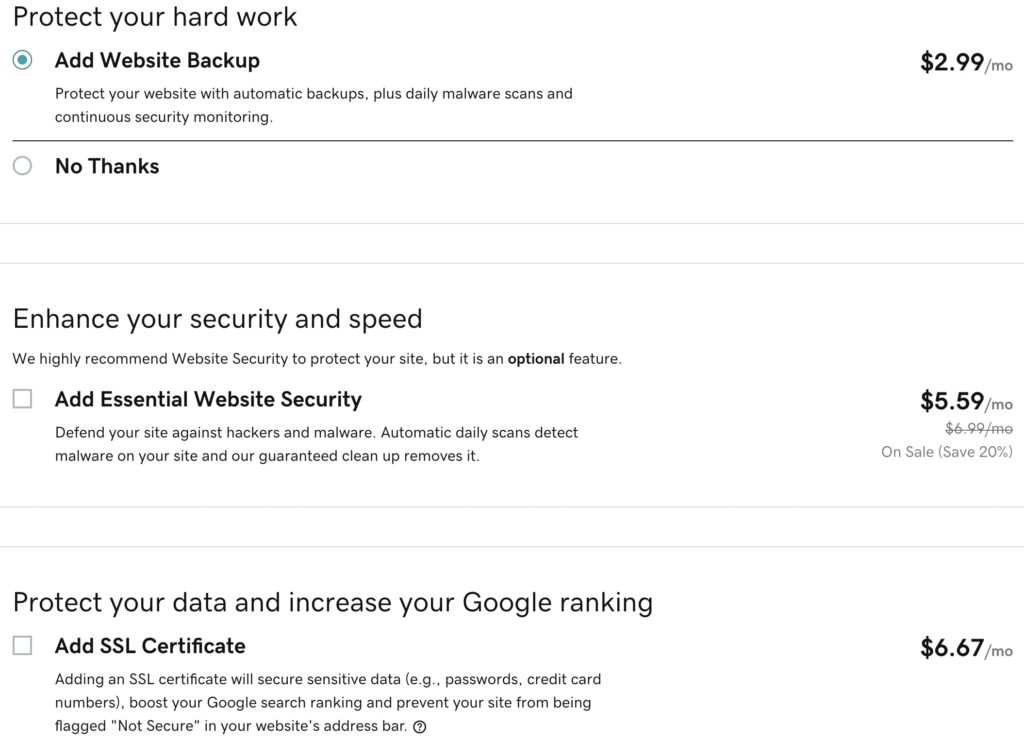
When it comes to email accounts, web hosting solutions differ in their offers.
- For example, all SiteGround, HostGator, A2 Hosting and Hostinger hosting accounts include a free email account.
- GoDaddy includes a free business email for the 1st year with their basic plan. The Microsoft Office 365 mailbox comes with 5GB of dedicated storage and a shared online calendar.
- iPage and GreenGeeks let users create unlimited email accounts. They are branded for the user domain and include email forwarding and autoresponders.
4. Once Your Site Grows, Consider Changing Your Hosting Plan
Web hosting providers offer different hosting types. If you are just starting out or have a low-traffic website, you should opt-in for shared web hosting. It’s more than enough to maintain and run your website(s). However, once your site(s) grows, it’s easy to migrate from one hosting to another or upgrade to more expensive web hosting.
Shared web hosting – Best for new websites and blogs. All websites are stored on one physical hosting server where they share server resources like storage, bandwidth, RAM and computing power. If your website doesn’t get much traffic, this is the best place to start. Jump back to our top 10 list.
VPS hosting – VPS stands for a virtual private server. Although VPS is similar to shared hosting (speed and uptime wise) and it stores multiple websites on the same server, it provides more customization options and you’ll have more control. With VPS you can scale your resources based on your needs.
Cloud hosting – Type of hosting service which allows many computers to work together, run applications, and use combined computing resources. Cloud-hosted websites can use the resources of multiple servers, which means they’re not limited to a single server location.
Managed WordPress – Best for high traffic WordPress sites. WordPress managed hosting covers the same hosting needs as general web hosting services, however, its main focus is to optimize the performance of a WordPress site.
Dedicated hosting – Best for big, enterprise websites. Type of hosting server that gives website owners the resources of one entire server for their website. This type of hosting provides websites with the ability to handle large amounts of traffic and the ability to customize it to their needs in terms of CPU, RAM, disk space, and software.
- Detailed reviews to all the hosting companies we’ve monitored so far can be found here.
- If you want us to review, compare and track more web hosting companies, simply send us an email – info@hostingfacts.com
- If you wish to leave your own review, you can do it here. Please note that we get a lot of submissions and we only accept genuine and helpful user reviews.

Comments
Post a Comment